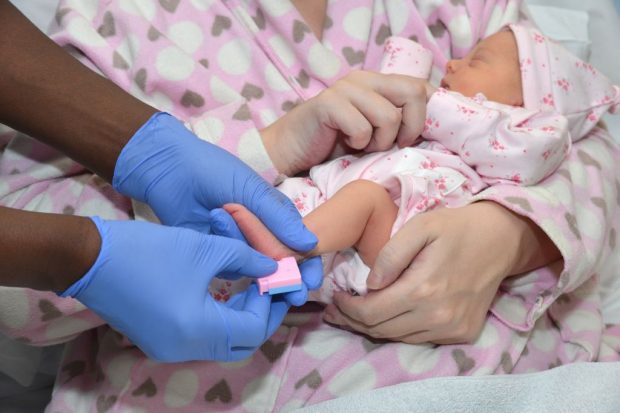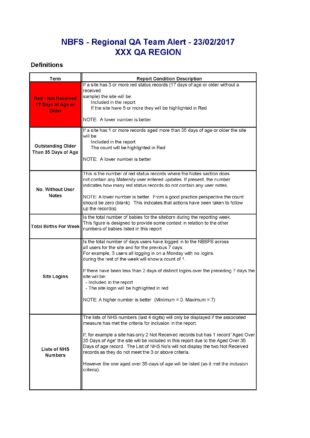We offer all babies born in England newborn blood spot (NBS) screening for 9 rare but potentially disabling or life-threatening conditions.

Timely screening is very important to make sure babies who test positive can be treated early, improving their health and, in some cases, preventing severe disability or even death. The Newborn Blood Spot Failsafe Solution (NBSFS) is mandated for use by all maternity units to minimise the risk of NBS screening being delayed or missed.
The NBSFS is a web-based programme. Trained users covering every maternity unit in England log on daily. The system flags up babies in their area who may have missed screening.
A weekly quality report shows the activity at each NBSFS maternity site. It shows, among other things, how many babies have had no blood spot card received in the screening lab by day 17 (‘red flagged record’) on the NBSFS system.
NBSFS maternity sites appear on the weekly exceptions report if they exceed 4 red flagged records (excluding repeat samples).
These reports show that there have been improvements in all measures over the past year. For example, in the first 3 weeks of February, no NBSFS sites in England exceeded 4 red flagged records, compared with 8 sites for the same period last year.
This is great news for babies born in England as it shows the vast majority are receiving NBS screening tests on time.
There is still work to do. A few babies (mostly those requiring repeat samples) still sometimes reach day 35 and beyond before completing screening. The number of such babies had been decreasing but then levelled out before showing a slight increase recently. Some of these babies have complex health problems and this can present a challenge to timely screening.

We now issue a quarterly report to the national screening quality assurance service (SQAS) with data presented regionally.
Some regions perform consistently well with very few red flagged records. We hope, in a future blog post, to share some of their secrets for success.
Thanks to all those involved in the NBS screening pathway for their work in making sure more babies than ever are receiving timely screening and getting off to the best start in life.
PHE Screening blog
PHE Screening BLOG articles provide up to date news from all NHS screening programmes – replacing our previously published newsletters.
You can register to receive updates direct to your inbox, so there’s no need to keep checking for new blog articles.